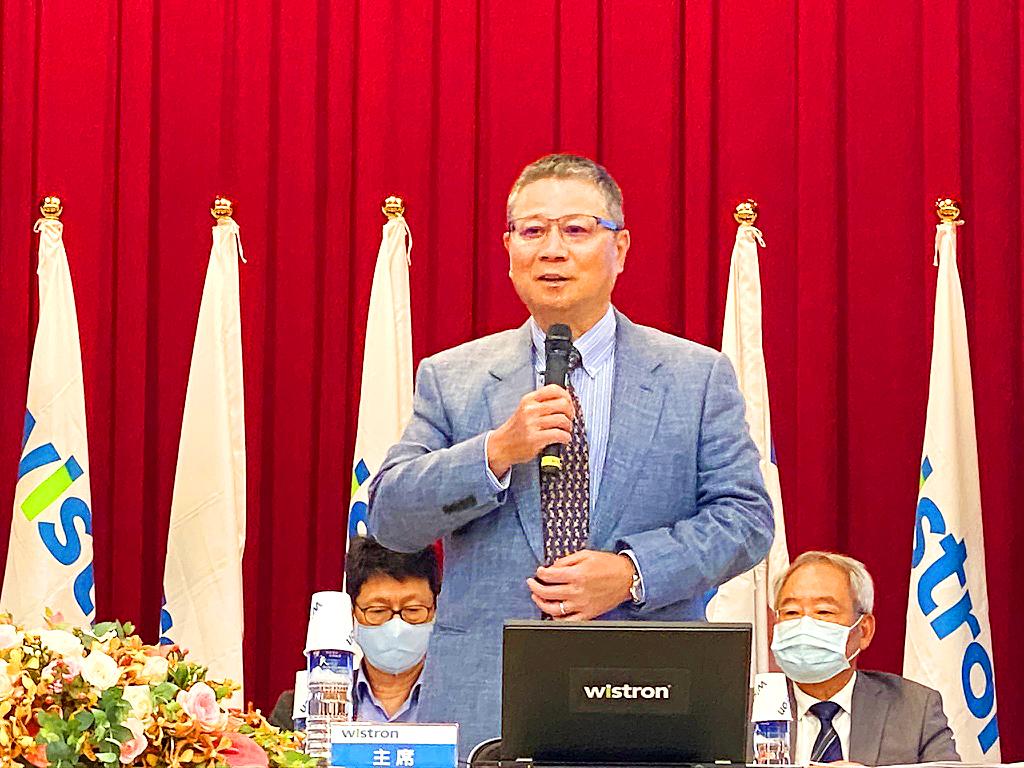Contract electronics maker Wistron Corp (緯創) is planning to expand production in Taiwan and Mexico this year as part of its global expansion.
The company expects to spend NT$16 billion (US$562.27 million) in capital expenditure this year, largely to be spent in Taiwan and Mexico, Wistron chairman Simon Lin (林憲銘) said at an investors’ conference on Wednesday.
Wistron’s global expansion plan is intended to reduce risks amid growing geopolitical tensions, Lin said.

Photo: CNA
Moreover, production diversification should allow the company to locate is facilities closer to international customers, he added.
In addition to Taiwan and Mexico, Wistron is considering investments in Vietnam later this year as part of its Southeast Asian development plans, Lin said.
China accounts for between 50 percent and 60 percent of Wistron’s production capacity, but that share is expected to fall as investment in Taiwan, Mexico and Vietnam rises, he said.
Capital expenditures for this year would also be put toward developing value-added products such as automotive electronics, servers and artificial intelligence devices, Lin said.
To meet funding demands, Wistron is selling up to 250 million shares in Taiwan or as global depositary receipts overseas.
Wistron on Wednesday said that net profit last year rose 20.6 percent year-on-year to NT$10.47 billion, or earnings per share of NT$3.76, while its consolidated sales totaled NT$862.08 billion, up 2 percent from a year earlier.
With the strong earnings, Wistron has proposed to issue a NT$2.2 cash dividend per share, suggesting a payout ratio of 58.51 percent.
Based on the closing price of Wistron shares at NT$29.6 yesterday, the dividend yield would be 7.43 percent.
Wistron president Jeff Lin (林建勳) said that the impact from a shortage of raw materials for notebook computer production had been eased to some extent from the previous year.
The company is to place a greater emphasis on commercial personal computers this year, with the expectation that shipments should rise 40 percent from last year, he said.
Separately, PC vendor Acer Inc (宏碁) on Wednesday said that its net profit last year was NT$10.897 billion, an 11-year high.
The 81 percent year-on-year increase was part of a rise in earnings per share to NT$3.63, compared with NT$2.01 in 2020, Acer said.
Consolidated sales totaled NT$319.01 billion, up 15.1 percent from 2020, with gross margin improving to 11.7 percent and net margin standing at 4.4 percent, the highest in the company’s history.
Given its strong showing last year, the company has proposed issuing a NT$2.28 cash dividend per share, representing a payout ratio of 62.81 percent.

TECH BOOST: New TSMC wafer fabs in Arizona are to dramatically improve US advanced chip production, a report by market research firm TrendForce said With Taiwan Semiconductor Manufacturing Co (TSMC, 台積電) pouring large funds into Arizona, the US is expected to see an improvement in its status to become the second-largest maker of advanced semiconductors in 2027, Taipei-based market researcher TrendForce Corp (集邦科技) said in a report last week. TrendForce estimates the US would account for a 21 percent share in the global advanced integrated circuit (IC) production market by 2027, sharply up from the current 9 percent, as TSMC is investing US$65 billion to build three wafer fabs in Arizona, the report said. TrendForce defined the advanced chipmaking processes as the 7-nanometer process or more

Who would not want a social media audience that grows without new content? During the three years she paused production of her short do-it-yourself (DIY) farmer’s lifestyle videos, Chinese vlogger Li Ziqi (李子柒), 34, has seen her YouTube subscribers increase to 20.2 million from about 14 million. While YouTube is banned in China, her fan base there — although not the size of YouTube’s MrBeast, who has 330 million subscribers — is close to 100 million across the country’s social media platforms Douyin (抖音), Sina Weibo (新浪微博) and Xiaohongshu (小紅書). When Li finally released new videos last week — ending what has

OPEN SCIENCE: International collaboration on math and science will persevere even if the incoming Trump administration imposes strict controls, Nvidia’s CEO said Nvidia Corp CEO Jensen Huang (黃仁勳) said on Saturday that global cooperation in technology would continue even if the incoming US administration imposes stricter export controls on advanced computing products. US president-elect Donald Trump, in his first term in office, imposed restrictions on the sale of US technology to China citing national security — a policy continued under US President Joe Biden. The curbs forced Nvidia, the world’s leading maker of chips used for artificial intelligence (AI) applications, to change its product lineup in China. The US chipmaking giant last week reported record-high quarterly revenue on the back of strong AI chip

Qualcomm Inc’s interest in pursuing an acquisition of Intel Corp has cooled, people familiar with the matter said, upending what would have likely been one of the largest technology deals of all time. The complexities associated with acquiring all of Intel has made a deal less attractive to Qualcomm, said some of the people, asking not to be identified discussing confidential matters. It is always possible Qualcomm looks at pieces of Intel instead or rekindles its interest later, they added. Representatives for Qualcomm and Intel declined to comment. Qualcomm made a preliminary approach to Intel on a possible takeover, Bloomberg News and other media